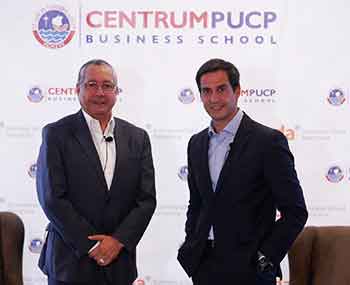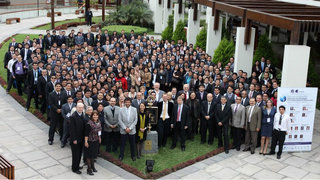2nd Digital Level of Management in Peru report by EADA and Centrum PUCP
 The majority of general managers in Peru are yet to lead the digital transformation of their companies. This is the conclusion of the 2nd Digital Level of Management in Peru report by EADA and Centrum Católica Graduate Business School which was based on a survey of more than 500 managers from different sectors and companies. This responsibility still remains in areas such as Business and Technology (31%) and to a lesser extent in areas such as Marketing and Sales (23%), Human Resources (8%) and R&D (7%). Only 31% of general managers are leading the digital strategy of their company.
The majority of general managers in Peru are yet to lead the digital transformation of their companies. This is the conclusion of the 2nd Digital Level of Management in Peru report by EADA and Centrum Católica Graduate Business School which was based on a survey of more than 500 managers from different sectors and companies. This responsibility still remains in areas such as Business and Technology (31%) and to a lesser extent in areas such as Marketing and Sales (23%), Human Resources (8%) and R&D (7%). Only 31% of general managers are leading the digital strategy of their company.
In terms of defining policies and digital strategies, just over 50% of Peruvian companies have established digital environment guidelines. This represents a slight increase compared to the figures of 2018 but many companies are still yet to define them. For example, more than 50% of the companies in the survey stated that they have an omnichannel approach with their customers and suppliers. However, there is still a lot of work to be done in this area which is key to facilitating the relationship between companies and their stakeholders.
According to Ramon Costa, director of the study and the Master in Digital Transformation and Project Management at EADA, “the digital transformation of companies goes beyond the simple integration of technological tools and applications. It implies revising, rethinking and redesigning communication processes and internal collaboration, the relationship with clients, users, suppliers and members as well as the business model.”
Digital skills
The study also reveals that a large number of managers are still learning about digital skills and only a few have completely adopted them on a daily basis. As Costa points out, “operations skills have been incorporated well but there is still resistance to tactical and strategic skills”. This is attested by the fact that the digital skills in which managers scored most highly were those related to “Leadership and Communication” (management and team motivation, onsite and online leadership, generating trends, corporate communication) and “Productivity and Security” (a set of skills which maximise the efficiency of time and resources such as time management, analysis and optimisation of processes using technology, cybersecurity, corporate digital responsibility). This last point is demonstrated by the fact that an increasing number of companies in Peru are setting up safe environments for the exchange of information and transactions in their relations with clients and suppliers.
 On the other hand, they scored poorly on all the skills related to “Creativity and Innovation” which are essential when creating new products, services as well as a competitive advantage. The report warns that digital technology is underused mainly due to a lack of knowledge of how to integrate new technological trends such as A.I, virtual and augmented reality, robotics, the Internet of Things (IoT) and Blockchain into the organisation. According to Costa, “there is a low awareness of the digital reputation of their companies, the competition and the sector and companies still need to learn how to monitor their clients on the web”.
On the other hand, they scored poorly on all the skills related to “Creativity and Innovation” which are essential when creating new products, services as well as a competitive advantage. The report warns that digital technology is underused mainly due to a lack of knowledge of how to integrate new technological trends such as A.I, virtual and augmented reality, robotics, the Internet of Things (IoT) and Blockchain into the organisation. According to Costa, “there is a low awareness of the digital reputation of their companies, the competition and the sector and companies still need to learn how to monitor their clients on the web”.
According to Percy Marquina, General Director at Centrum PUCP, “technology offers us great opportunities but it also raises many dilemmas. Managers in Peru need to train up in the technical use of the tools they have available to them as well as the criteria and strategic decisions that they can adopt”.
